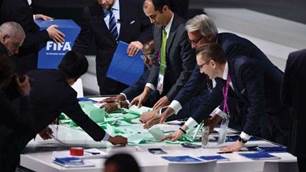The "Winners" and "Losers" from a crazy month of sport.
Female athletes among the winners in a crazy month of sport gone by.
WINNER: EXPOSURE OF WOMEN'S SPORT
WINNER: KAZAKHSTAN
Poor Kazakhstan, so often mocked, but ready for its moment in the sporting spotlight in the coming month. The Astana team will be out front in the Tour de France, the Kazakh tennis players come to Australia to contest a Davis Cup quarter-final in Darwin, and then there’s the big one – the nation’s bid to host the 2022 Winter Olympics in Almaty, which the IOC will decide upon on July 31 in Malaysia. Almaty might well set the record for most obscure Games host, as well as ignite an international outcry. At the very least, Kazakhs can argue that it won’t have to ship competitors to a site 200km away, as bid rival Beijing is planning to do.
WINNER: JASON DAY
There was a hope, however slight, that Jason Day was crafting a fairy-tale at the US Open. A day after he had collapsed on the course because of a vertigo-induced dizzy spell, Day somehow played his way into the lead of the toughest event in golf with a rousing Saturday afternoon performance. To ask him to endure one more round at Chambers Bay was always likely to be too much, and Day receded, leaving Dustin Johnson’s horror three-putt on the last to become perhaps the lasting memory of the tournament. But Day’s resilience, and the way it won over the fans at the course and beyond, was a significant career moment for a man who still shapes as Australian golf’s next Major champion. While it’s always fraught to compare strains of sporting toughness, and with golf no less, it’s hard to imagine there will be few displays of athletic will to match Day’s this year.
WINNER: THE FBI
When it comes to sports, the FBI is on a winning streak of late. While the world’s football fans pulled their hair out for years over what to do about FIFA, it was the feds that finally provided the circuit-breaker. Their intervention may finally bring to account an organisation that behaved like it was above any kind of accountability. And curiously, this probably happened because of America’s remove from the centre of football power (one might think that an investigation of, say, the NFL would encounter more political resistance within the US), as well as the enhanced ability to track money flows granted to law enforcement under anti-terror laws. On top of the FIFA arrests, the FBI found itself in a case involving baseball’s St Louis Cardinals, alleged to have hacked the database of the Houston Astros. We’re not sure if this is the best use of FBI resources – probably better than Mulder and Scully chasing X-Files, we guess – but if J. Edgar Hoover was a sports fan, he’d be proud.
LOSER: KIERAN FORAN CONTRACT CONTROVERSY
If we thought that Daly Cherry-Evans’ turnabout would be the final straw for the NRL’s archaic system of player movement, the Kieran Foran contract controversy proved to be the aftershock that rumbled louder. The debacle at Parramatta – which had agreed to the demands of Foran’s management for an escape clause, then angered the Kiwi playmaker by trying to change the dubious terms of the deal – had figures such as Phil Gould lamenting the sorry state of rugby league governance. Gould is right. This situation reflects so poorly across the whole of the game, calling into question the NRL’s standing. What modern, professional sport would conduct itself like this? That the player manager felt they had to ask for such a clause is the worst kind of entitlement (although logical, considering the Eels’ internal machinations) and utterly corrosive to the relationship between footballer and club. That the club felt they had to give it reflects the stress that many teams feel in acquiring and overvaluing talent, particularly within a salary cap system that operates as a blunt force. That the player is often forced into choices of having to leave his team, or leave dollars on the table, and then have his personal honour questioned at every step. The phenomenon isn’t new, although the growing tilt in the balance of power towards the players has created a new kind of urgency around this issue. With the amounts of money involved, and the direct manner in which it impacts the sport’s fan following, how leagues regulate the movement of talent is among their most important priorities. The chatter around player moves has long been an example of the old saying about publicity – that even bad publicity is good, and the worst thing of all is silence. But there’s a limit, as the NRL is finding, to how bad that bad publicity can be.
LOSER: SEPP BLATTER
At the time our previous edition went to print, Sepp Blatter had yet to announce his resignation from FIFA, which looked like a realistic possibility after the arrests at the hotel in Zurich. Blatter made known his intention to step down only a week after he had been re-elected at the FIFA Congress in late May, although the world would have to wait until world football’s peak body convened another meeting sometime between December and March. Let’s face it – we’re all so cynical when it comes to Sepp these days, was it any surprise that he might backslide on this promise, particularly as time went on? He’s moved his position from “resigning” to “in the hands of the Congress”. By this stage, Blatter’s reign has become the sports world’s equivalent of a vampire, seemingly unkillable. We’ll only believe it’s over once the stake has been driven through the heart.
LOSER: SYDNEY
This is not much of a debate anymore, really, but in the eternal contest of sports-town repute in this country, the pride of Sydney received the ultimate putdown. When the head of the rugby league, the game of the north, can travel to Melbourne and flat-out tell the denizens of Aussie rules territory that they do it better, much better, so much so that the NRL wanted to bring more big-ticket events there, well, that’s hard to recover from. David Smith didn’t leave any ambiguity for those holding the major-events purse strings in NSW: “Historical under-investment by previous governments has left us in a situation that’s not as good as what we have” in Melbourne. It’s no surprise in the context of the Victorian capital’s social culture, but it does raise a big-picture question, one that wasn’t heard so much in the heady years from 1993 to 2000: how is it that an Olympic city, and one that did it so well, can have such weaknesses as a sports town?
Related Articles

We need to formalise the ownership of bragging rights

FIFA earning high praise for its widespread reforms





.png&h=115&w=225&c=1&s=1)









